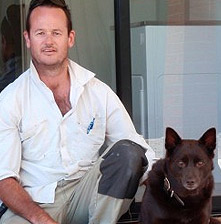Making an offer on a property – We interview 6 experts
Purchasing property will be one of the largest financial decisions of your life so it’s one that should not be taken lightly. But navigating the maze of property purchase is not always as easy as it sounds. Before you sign anything, in fact before you’ve even begun negotiating your offer on a house, you need to be sure that’s it’s the property for you.
In order to lend you a helping hand, we caught up with some of the top experts in the industry to find out their top tips on making an offer on a property. Avoid the mistakes others have made and take in the wealth of information that these experts have to offer.
Andrew Mirams of Intuitive Finance – The finance expert
 Get your finance in order early. If looking to buy, arrange a pre-approval in advance. It saves you time and hassle when the pressure comes on to make the offer knowing that your finance is already in place.
Get your finance in order early. If looking to buy, arrange a pre-approval in advance. It saves you time and hassle when the pressure comes on to make the offer knowing that your finance is already in place.
- Make sure you have your finances correctly structured Is it a home purchase that may become a future investment? Should you pay principal & interest repayments or interest only? How much should you contribute? Are there any hidden fees or costs with your finance? Should you fix all or some of your loan? These are all vitally important questions that you need expert help with to ensure what you select is what you want to assist you with your goals.
- Don’t put too many clauses or conditions on an offer – it turns vendors off and can be the difference between securing the property or not.
- Who’s the buyer? It’s staggering how many people get to the offer stage and then purchase in the wrong name or entity (In Victoria and QLD this can be quite easily amended but in NSW it can’t be and can trigger double stamp duty). Get your advice in advance from your Accountant or Lawyer.
 Inspect the contract. Again, it’s surprising how many people buy without having their lawyer or conveyancer check that the contract is in order. Hence the phase “Caveat Emptor” which means “Let the buyer beware” and means “sold as is,” this term means that the buyer assumes the risk that a product may fail to meet expectations or have defects.
Inspect the contract. Again, it’s surprising how many people buy without having their lawyer or conveyancer check that the contract is in order. Hence the phase “Caveat Emptor” which means “Let the buyer beware” and means “sold as is,” this term means that the buyer assumes the risk that a product may fail to meet expectations or have defects.
- Buy with your head and not your heart. Emotions can lead to poor decisions so before making an offer ensure it’s a property that makes financial sense as well as one you love.
Scott Munro of Soho Lawyers – The legal expert
 Show me the money – can you get finance? It seems obvious, but make sure that you have your finance arranged. Speaking to an experienced home loan broker at the outset can save you time, stress and effort. Arranging the money may take some time, so do this well in advance. If time is tight, and you are not buying at auction, you may be able to include a “subject to finance” clause in the contract which can allow you to end the contract if finance isn’t obtained.
Show me the money – can you get finance? It seems obvious, but make sure that you have your finance arranged. Speaking to an experienced home loan broker at the outset can save you time, stress and effort. Arranging the money may take some time, so do this well in advance. If time is tight, and you are not buying at auction, you may be able to include a “subject to finance” clause in the contract which can allow you to end the contract if finance isn’t obtained.
- Review the contract – do you know what you are buying? Buying a house is a huge purchase. For most of us, it will be our most expensive transaction. It is important to have the contract properly reviewed before you sign so that you are fully informed about the property you are buying. The important details include a review of the title, any easements or restrictions which apply to the land, and a review of the certificates relevant to the property. As there is no obligation on a vendor to include all of the certificates which relate to their property in the sale contract, it may be necessary to make further inquiries, and get copies of these certificates. Unpaid rates, land tax, and owners corporation certificates are just some of the searches that are needed to make sure that you know what you are bidding on.
- What are your plans for the property – can you do what you want? If you are looking to subdivide or renovate the property, it is worth confirming that this can be done before you sign the contract. It is always important to check the zoning of the property. For example, some inner-city pads may look like a funky apartment, but they are commercially zoned, and as such, cannot be used as a residence. These investigations may necessitate discussions with a planner, the local council and your builder.
- Inspect the property carefully. Always inspect the property. Measure the boundaries to make sure that it aligns with the title. If there is a separate car park, or storage unit, they should also be inspected and verified. You may also want to have the property inspected by a qualified builder, and a pest inspector to make sure that the building is sound.
- Signing the contract. If you are not sure how you want to own the property at the time you buy it, you should sign the contract in your name “and / or nominee”. This will then allow you to “nominate” the purchaser at a later date before settlement.
Michael Yardney of Metropole – The negotiation expert
 Always know the end result you want – your bottom line – before commencing negotiations. It’s a bit like when you’re planning your holiday. Firstly decide your destination – where you want to end up, then work backwards to decide the best way to get there. In negotiations and in life, if you don’t have a plan of your own, you’ll be part of someone else’s.
Always know the end result you want – your bottom line – before commencing negotiations. It’s a bit like when you’re planning your holiday. Firstly decide your destination – where you want to end up, then work backwards to decide the best way to get there. In negotiations and in life, if you don’t have a plan of your own, you’ll be part of someone else’s.
- Then treat your negotiation like a game – you need to be involved but not too much. If you are too emotionally involved, you will lose your perspective and make emotional rather than subjective decisions. Like all games, you must understand the rules. A skilled negotiator understands the structure and stages of negotiation. If you play a game and don’t know the rules, how do you know when the game has begun, reached its mid-point, or neared its conclusion?
- Great negotiators are never afraid to ask the other party questions or for advice. Even if you know the answers. Asking questions tends to establish a climate of trust. One of the skills of being a good negotiator is knowing when not to talk but to listen.
I have found that many inexperienced negotiators are too eager to show off just what they know. This can work against them as they often reveal too much too soon, in particular about what they are willing to give up to get the deal. A good negotiator recognizes that they must let go of their ego satisfying position of “know it all” and instead assume the profit making position of innocence. They realise that you can gain a lot from being silent and listening and at time using facial expressions, not your voice, to make a point.
Stephen Tickell of Hocking Stuart – The real estate expert
When buying real estate there are several absolutes you must obey! Here’s just a few to get you started!
 It may seem very obvious, but do your homework! If at all possible, find out what other similar properties have sold for recently. Get the facts, and then ask an expert (agent, advocate, valuer) to make an independent assessment on price. Agents, and other people in the industry have access to valuable information that you can’t always get online.
It may seem very obvious, but do your homework! If at all possible, find out what other similar properties have sold for recently. Get the facts, and then ask an expert (agent, advocate, valuer) to make an independent assessment on price. Agents, and other people in the industry have access to valuable information that you can’t always get online.
- Check the local zoning and the effect this might have on future developments that may ultimately spring up right beside your beautiful new home. Also see that there are no development permit applications adjacent the property that might severely affect your ‘quiet enjoyment’ in years to come. Or indeed, the view you think you bought might not be there when your time comes to sell, severely hindering the re-sale value. Many an apartment-buyer has bought a property with a spectacular view only to see another building spring up next door that blocks out the view that was! Southbank, adjacent Melbourne’s CBD is a great example of this.
- Assuming, like most people, you’ll need to finance your purchase, go chat to your bank or Mortgage Broker first and get pre-approval. Nothing worse than buying a property assuming you’re fine to raise a mortgage against a property, only to find out later your assumption was wrong. Once you’ve bought, you’ve bought, particularly if it’s at auction!
- If you have any concerns whatsoever about the integrity of the structure of a property you are intending to buy, ensure you get a bona fide ’builder’s report or architects inspection carried out. This is NOT to be confused with “my mate the builder’s” quick run through. It must be an official written report that you can have faith in, which someone is prepared to put their name to. Once you buy at auction, it’s too late to change your mind after you find out later on that the property has major issues.
- Don’t buy a property just because it’s cheaper than the one you really want. Once you’ve bought, you are most probably going to live there and spend much of your life there for many years. The last thing you want is to buy a property that seemed cheap at the time, only to realise later that you could’ve afforded the one you really wanted, and you regret it forever! BUY THE HOUSE YOU WANT!
- When in doubt, chat to someone who knows their stuff (your local friendly agent for example) before you buy. Often there are things that are not so obvious simply by looking at the property or reading through the section 32 (vendor’s statement). There may well be other factors that could have an adverse (or positive) effect on the property in future that only your local expert may be aware of.
Ty Beveridge of Kindle Partners – The accounting expert

- Do the numbers! Each investment property is different, so ensure you allow for all the acquisition costs (eg stamp duty, legal fees), together with the costs of any improvements / repairs that may be required following settlement.
- Make sure the numbers work. Ensure you have done your sums.The majority of property investments are for the long term, and the cost of holding and maintaining the property each year can be less than the income received.Yes, you are likely to receive a deduction, but is the shortfall (after tax) within expectations, and affordable?
- Finance – ensure you have pre-approval. We can all get caught up in the action on auction day, so make sure you know your limits when purchasing a property, by having locked in your loan approval ahead of time.
- Don’t be afraid to walk away. Do your research beforehand, and if the price is driven too high during the selling process – walk away! You make far more money when you buy an investment property well, than you do when you sell.
Peter Alexander of Mr Inspector – The building and pest expert
 Have the house inspected for termites – You won’t see termites; they don’t come out and walk around the home like common ants. Many things have to be done to try and locate termites during a house inspection – timber testing/tapping, moisture readings, thermal imaging and radar meters to name a few. Some people see an uneven floor and think the home is going to collapse. Most issues are under the home and some are major and some are minor.
Have the house inspected for termites – You won’t see termites; they don’t come out and walk around the home like common ants. Many things have to be done to try and locate termites during a house inspection – timber testing/tapping, moisture readings, thermal imaging and radar meters to name a few. Some people see an uneven floor and think the home is going to collapse. Most issues are under the home and some are major and some are minor.
- Don’t rely on your Builder Mate – We strongly advise home buyers not to have a friend inspect their potential home – We acknowledge that you may use a builder friend and one who will know how to build a home but it is highly likely they won’t have the equipment or the time to do the inspection properly. Thorough building Inspections cannot be done in half an hour while the agent has an open for inspection. You need to get in the roof and under the house. You need to timber test everything for hollowness to locate termite issues. You need to have a moisture meter and a thermal camera to assess for damp and leaks.
- Open For Inspections are an excellent time to investigate the state of the house. So here’s what to look for – Is the block of land sloped or is it flat? If it’s elevated or sloped there are potential surface drainage issues if drainage has not been installed or not installed adequately. Check the boundary fencing for any leaning. Leaning normally means rotten fence posts and replacement will be required. With masonry walls check for large cracks and step cracks through the mortar. Also stand on a corner and run your eye along the wall and check to see
 that it is straight with no bowing and unevenness. Look at all the lower walls outside the shower and even open hall cupboards of the shower backs onto it. If the paint is bubbling or deteriorated it is quite likely you have a leak.
that it is straight with no bowing and unevenness. Look at all the lower walls outside the shower and even open hall cupboards of the shower backs onto it. If the paint is bubbling or deteriorated it is quite likely you have a leak.
Look at the pergolas, verandas and carports. Give the posts a shake and see if they are wobbly. Look at the walls for any cracking in the paintwork or plaster. Diagonal cracks above doors and windows usually means some differential settlement in the footings and foundations has occurred. We sometimes attend building inspection whilst there is an open for inspection going on. We see people walk around and check doors and windows and when one binds a bit they start commenting that the home has problems.
Intuitive Finance, the Property Investors Choice
So there you have it, tips from some of the leading experts in their fields. But as some of our experts have highlighted, if you’re purchasing a property there’s no single person or article that can help you decide whether it’s the one for you. Do your own research, talk to the experts and wear your business hat. The perfect property might not present itself straight away but when it does, you’ll be pleased with your decision for years to come.When it comes to the finance of buying a house, talk to Intuitive Finance.
The world of banking and finance can be a pretty daunting one for both novice and sophisticated investors and since our establishment in 2002 we’ve focused on providing outstanding service and business standards. This approach was vindicated when we were recently named Victoria’s favourite mortgage broker at the 2015 Investors Choice Awards.If you’re looking to make an offer on a property, for expert advice and financial support for your personal situation do contact Intuitive Finance to ensure you have the right information and help on your side from the outset.
